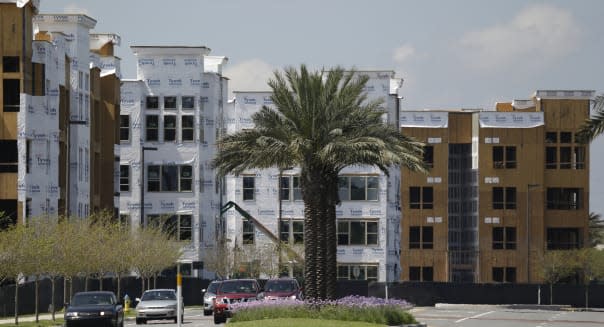Housing Starts Hit 7-Month Low; Setback Seen as Temporary

By Lucia Mutikani
WASHINGTON -- U.S. housing starts in October fell to a seven-month low, weighed down by a steep decline in the construction of multifamily homes, but a surge in building permits suggested the housing market remained on solid ground.
While the drop in groundbreaking activity reported Wednesday by the Commerce Department implied a moderation in residential investment early in the fourth quarter, it did little to change the view that the Federal Reserve would hike interest rates next month.
"Overall, fundamentals for the sector remain solid. Household formation is rising, demand for new homes is outstripping supply, and homebuilder confidence remains near its highest level in a decade," said Michelle Girard, chief economist at RBS in Stamford, Connecticut.
Groundbreaking dropped 11 percent to a seasonally adjusted annual pace of 1.06 million units last month, the lowest level since March, the Commerce Department said. October marked the seventh straight month that starts remained above 1 million units, the longest stretch since 2007. Building permits increased 4.1 percent to a 1.15 million-unit rate.
%VIRTUAL-WSSCourseInline-750%Rapidly rising household formation, mostly driven by young adults leaving their parental homes and a strengthening labor market, is supporting the housing sector.
Highlighting the housing market's underlying strength, a second report from the Mortgage Bankers Association showed applications for loans to purchase homes jumped 6.2 percent during the week ended Nov. 13 from a week earlier.
In the wake of the soft October housing numbers, Barclays trimmed its fourth-quarter gross domestic product estimate by one-tenth of a percentage point to a 2.2 percent annual rate.
Housing has contributed to GDP growth in each of the last six quarters, adding 0.2 percentage point to the third-quarter's 1.5 percent growth pace.
"Homebuilding may not keep the Fed from 'liftoff' but it will be their biggest concern. When Fed officials say they want to see more investment spending this recovery, they really mean residential housing construction," said Chris Rupkey, chief financial economist at MUFG Union Bank in New York.
Minutes of the Fed policy-setting committee's Oct. 27-28 meeting showed officials rallied behind a possible December increase in the U.S. central bank's benchmark overnight interest rate.
U.S. stock markets were trading higher, with the S&P homebuilding index rising 2.15 percent. D.R. Horton (DRI), the largest U.S. homebuilder, gained 1.69 percent. Lennar (LEN), the nation's second-largest homebuilder, advanced 2.22 percent.
The dollar was flat against a basket of currencies. Prices for longer-dated U.S. government debt pared their losses.
Land Labor, Shortages
Economists had forecast housing starts dropping to only a 1.16 million-unit pace last month. Many viewed the weakness in October as being related to land and labor shortages, constraints that have been flagged by homebuilders.
"Structural issues including a shortfall in immigrant labor are inhibiting construction. The supply shortage in the single-family market is not likely to be alleviated any time soon," said David Nice, an economist at Mesirow Financial in Chicago.
Groundbreaking on single-family home projects, the largest segment of the housing market, fell 2.4 percent to a 722,000-unit pace in October. Single-family starts were pulled down by a 6.9 percent plunge in groundbreaking activity in the South, where most homebuilding takes place. Single-family starts rose in the Northeast, the Midwest and the West.
Starts for the volatile multifamily segment plunged 25.1 percent to a 338,000-unit pace.
Single-family building permits rose 2.4 percent last month to their highest level since December 2007. Single-family permits in the South also hit their highest level since December 2007. Multifamily building permits increased 6.8 percent.
"The October permit requests were above the starts number, and for the past three months permits have been running a little ahead of the building pace, so don't be surprised if housing activity rebounds solidly in November," said Joel Naroff, chief economist at Naroff Economic Advisors in Holland, Pennsylvania.
